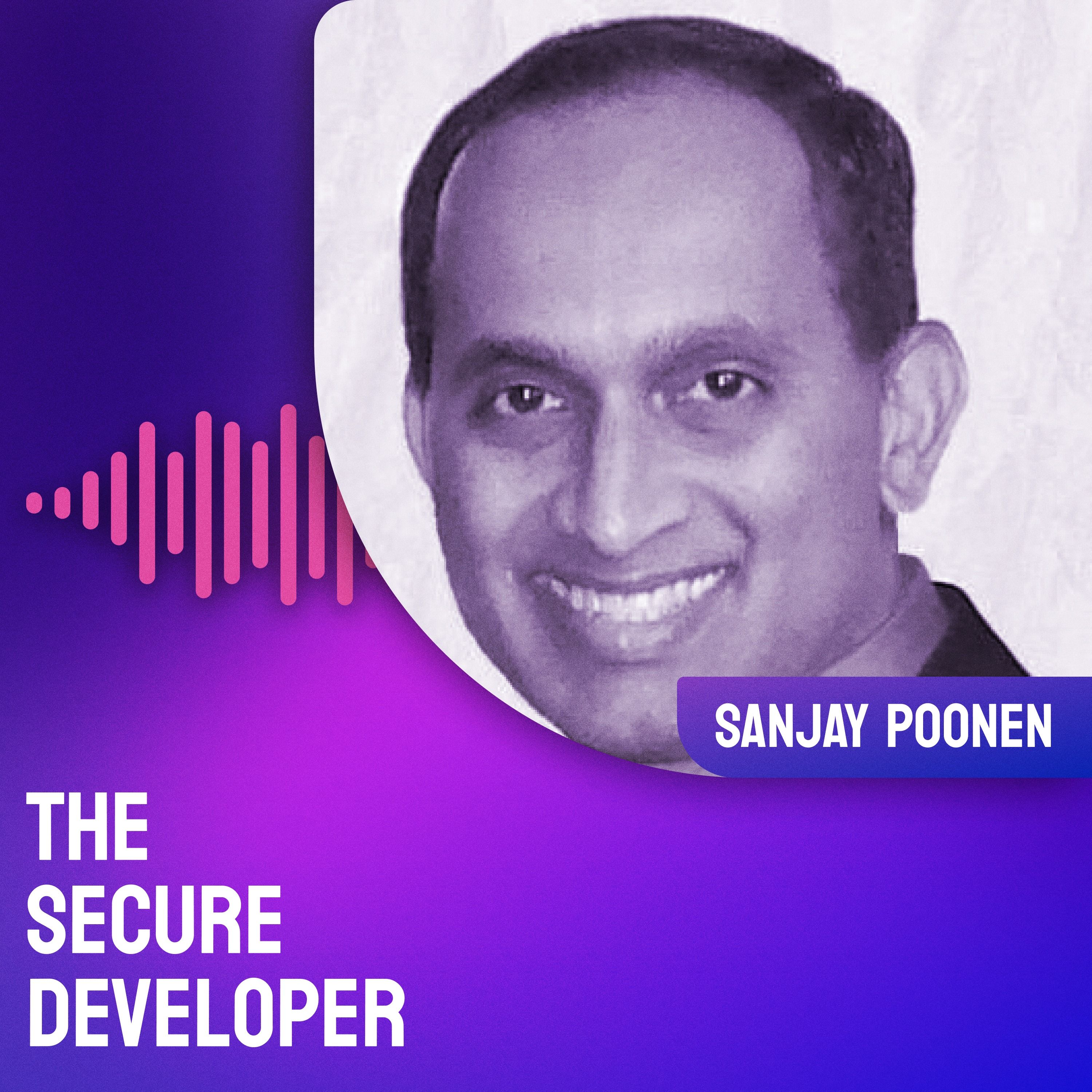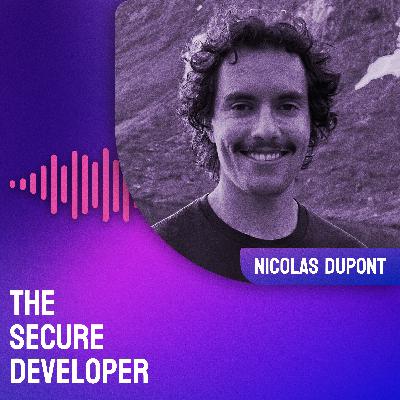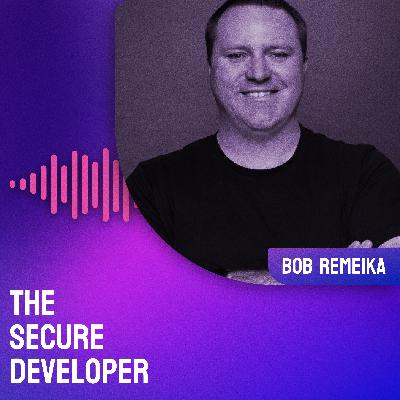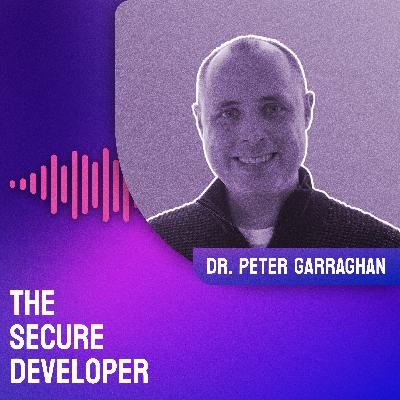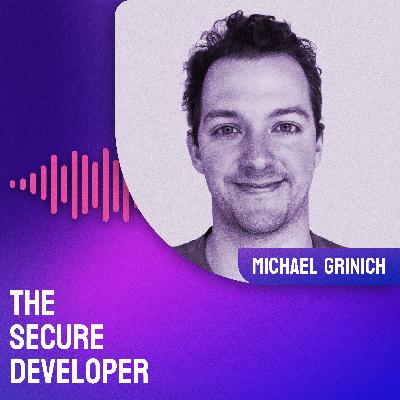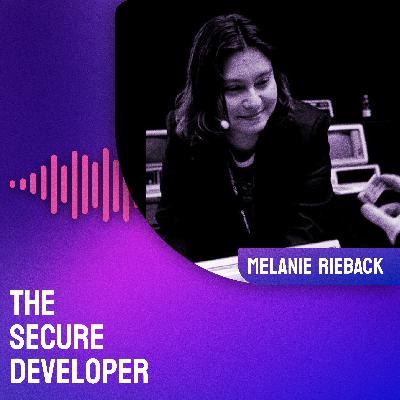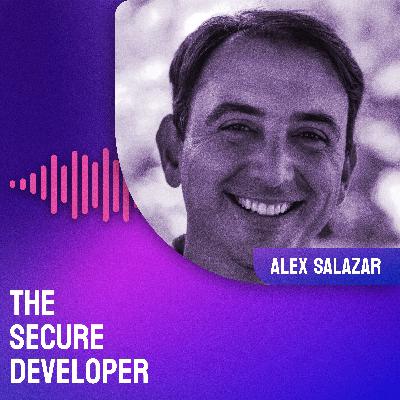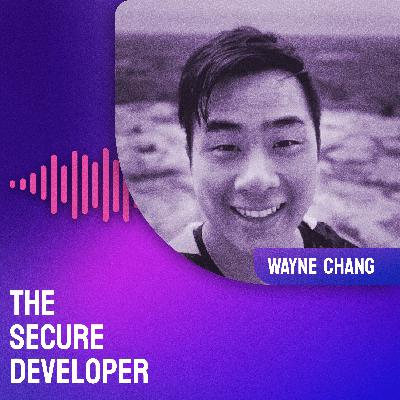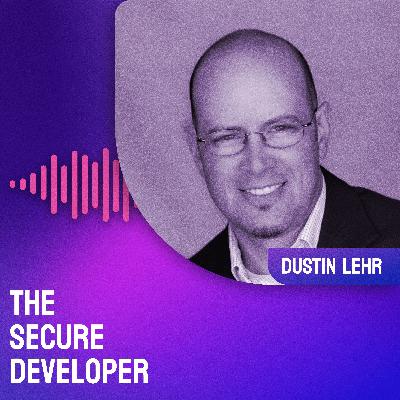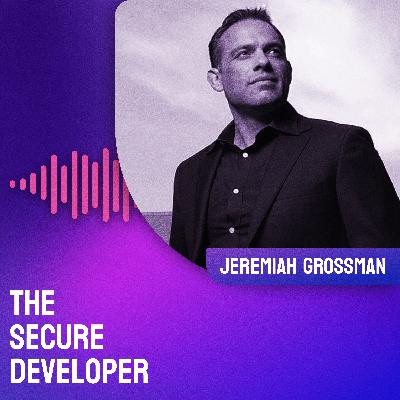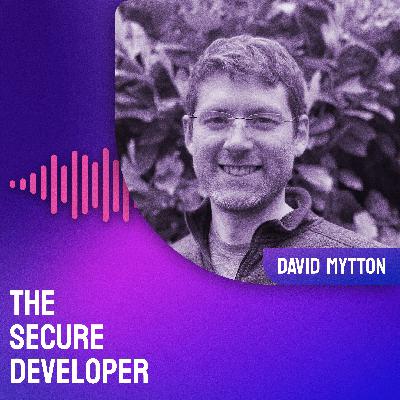Подборка The Secure Developer
The Secure Developer

172 Episodes
Reverse
Episode SummaryThe future of cyber resilience lies at the intersection of data protection, security, and AI. In this conversation, Cohesity CEO Sanjay Poonen joins Danny Allan to explore how organisations can unlock new value by unifying these domains. Sanjay outlines Cohesity’s evolution from data protection to security in the ransomware era, to today’s AI-focused capabilities, and explains why the company’s vast secondary data platform is becoming a foundation for next-generation analytics.Show NotesIn this episode, Sanjay Poonen shares his journey from SAP and VMware to leading Cohesity, highlighting the company's mission to protect, secure, and provide insights on the world's data. He explains the concept of the "data iceberg," where visible production data represents only a small fraction of enterprise assets, while vast amounts of "dark" secondary data remain locked in backups and archives. Poonen discusses how Cohesity is transforming this secondary data from a storage efficiency problem into a source of business intelligence using generative AI and RAG, particularly for unstructured data like documents and images.The conversation delves into the technical integration of Veritas' NetBackup data mover onto Cohesity's file system, creating a unified platform for security scanning and AI analytics. Poonen also elaborates on Cohesity's collaboration with NVIDIA, explaining how they are building AI applications like Gaia on the NVIDIA stack to enable on-premises and sovereign cloud deployments. This approach allows highly regulated industries, such as banking and the public sector, to utilize advanced AI capabilities without exposing sensitive data to public clouds.Looking toward the future, Poonen outlines Cohesity's "three acts": data protection, security (ransomware resilience), and AI-driven insights. He and Danny Allan discuss the critical importance of identity resilience, noting that in an AI-driven world, the security perimeter shifts from network boundaries to the identities of both human users and autonomous AI agents.LinksCohesityNvidiaSnyk - The Developer Security Company
Follow UsOur WebsiteOur LinkedIn
Episode SummaryAs AI systems become increasingly integrated into enterprise workflows, a new security frontier is emerging. In this episode of The Secure Developer, host Danny Allan speaks with Nicolas Dupont about the often-overlooked vulnerabilities hiding in vector databases and how they can be exploited to expose sensitive data.Show NotesAs organizations shift their focus from training massive models to deploying them for inference and ROI, they are increasingly centralizing proprietary data into vector databases to power RAG (Retrieval-Augmented Generation) and agentic workflows. However, these vector stores are frequently deployed with insufficient security measures, often relying on the dangerous misconception that vector embeddings are unintelligible one-way hashes.Nicolas Dupont explains that vector embeddings are simply dense representations of semantic meaning that can be inverted back to their original text or media formats relatively trivially. Because vector databases traditionally require plain text access to perform similarity searches efficiently, they often lack encryption-in-use, making them susceptible to data exfiltration and prompt injection attacks via context loading. This is particularly concerning when autonomous agents are over-provisioned with write access, potentially allowing malicious actors to poison the knowledge base or manipulate system prompts.The discussion highlights the need for a "secure by inception" approach, advocating for granular encryption that protects data even during processing without incurring massive performance penalties. Beyond security, this architectural rigor is essential for meeting privacy regulations like GDPR and HIPAA in regulated industries. The episode concludes with a look at the future of AI security, emphasizing that while AI can accelerate defense, attackers are simultaneously leveraging the same tools to create more sophisticated threats.LinksCyborgOWASP LLM Top 10Snyk - The Developer Security Company
Follow UsOur WebsiteOur LinkedIn
Episode SummaryCan multi-factor authentication really “solve” security, or are attackers already two steps ahead? In this episode of The Secure Developer, we sit down with Paul Querna, CTO and co-founder at ConductorOne, to unpack the evolving landscape between authentication and authorisation. In our conversation, Paul delves into the difference between authorisation and authentication, why authorisation issues have only been solved for organisations that invest properly, and why that progress has pushed attackers toward session theft and abusing standing privilege.Show NotesIn this episode of The Secure Developer, host Danny Allan sits down with Paul Querna, CTO and co-founder of ConductorOne, to discuss the evolving landscape of identity and access management (IAM). The conversation begins by challenging the traditional assumption that multi-factor authentication (MFA) is a complete solution, with Paul explaining that while authentication is "solved-ish," attackers are now moving to steal sessions and exploit authorization weaknesses. He shares his journey into the identity space, which began with a realization that old security models based on firewalls and network-based trust were fundamentally broken.The discussion delves into the critical concept of least privilege, a core pillar of the zero-trust movement. Paul highlights that standing privilege—where employees accumulate access rights over time—is a significant risk that attackers are increasingly targeting, as evidenced by reports like the Verizon Data Breach Investigations Report. This is even more critical with the rise of AI, where agents could potentially have overly broad access to sensitive data. They explore the idea of just-in-time authorization and dynamic access control, where privileges are granted for a specific use case and then revoked, a more mature approach to security.Paul and Danny then tackle the provocative topic of using AI to control authorization. While they agree that AI-driven decisions are necessary to maintain user experience and business speed, they acknowledge that culturally, we are not yet ready to fully trust AI with such critical governance decisions. They discuss how AI could act as an orchestrator, making recommendations for low-risk entitlements while high-risk ones remain policy-controlled. Paul also touches on the complexity of this new world, with non-human identities, personal productivity agents, and the need for new standards like extensions to OAuth. The episode concludes with Paul sharing his biggest worries and hopes for the future. He is concerned about the speed of AI adoption outpacing security preparedness, but is excited by the potential for AI to automate away human toil, empowering IAM and security teams to focus on strategic, high-impact work that truly secures the organization.LinksConductorOneVerizon Data Breach Investigations ReportAWS CloudWatchSnyk - The Developer Security Company
Follow UsOur WebsiteOur LinkedIn
Episode SummaryBob Remeika, CEO and Co-Founder of Ragie, joins host Danny Allan to demystify Retrieval-Augmented Generation (RAG) and its role in building secure, powerful AI applications. They explore the nuances of RAG, differentiating it from fine-tuning, and discuss how it handles diverse data types while mitigating performance challenges. The conversation also covers the rise of AI agents, security best practices like data segmentation, and the exciting future of AI in amplifying developer productivity.Show NotesIn this episode of The Secure Developer, host Danny Allan is joined by Bob Remeika, co-founder and CEO of Ragie, a company focused on providing a RAG-as-a-Service platform for developers. The conversation dives deep into Retrieval-Augmented Generation (RAG) and its practical applications in the AI world.Bob explains RAG as a method for providing context to large language models (LLMs) that they have not been trained on. This is particularly useful for things like a company's internal data, such as a parental leave policy, that would be unknown to a public model. The discussion differentiates RAG from fine-tuning an LLM, highlighting that RAG doesn't require a training step, making it a simple way to start building an AI application. The conversation also covers the challenges of working with RAG, including the variety of data formats (like text, audio, and video) that need to be processed and the potential for performance slowdowns with large datasets.The episode also explores the most common use cases for RAG-based systems, such as building internal chatbots and creating AI-powered applications for users. Bob addresses critical security concerns, including how to manage authorization and prevent unauthorized access to data using techniques like data segmentation and metadata tagging. The discussion then moves to the concept of "agents," which Bob defines as multi-step, action-oriented AI systems. Bob and Danny discuss how a multi-step approach with agents can help mitigate hallucinations by building in verification steps. Finally, they touch on the future of AI, with Bob expressing excitement about the "super leverage" that AI provides to amplify developer productivity, allowing them to get 10x more done with a smaller team. Bob and Danny both agree that AI isn't going to replace developers, but rather make them more valuable by enabling them to be more productive.LinksRagie - Fully Managed Multimodal RAG-as-a-Service for DevelopersRagie ConnectOpenAIGemini 2.5Claude Sonneto4-miniClaudeClaude OpusCursorSnowflakeSnyk - The Developer Security Company
Follow UsOur WebsiteOur LinkedIn
Episode SummaryMachine learning has been around for decades, but as it evolves rapidly, the need for robust security grows even more urgent. Today on the Secure Developer, co-founder and CEO of Mindgard, Dr. Peter Garraghan, joins us to discuss his take on the future of AI. Tuning in, you’ll hear all about Peter’s background and career, his thoughts on deep neural networks, where we stand in the evolution of machine learning, and so much more! We delve into why he chooses to focus on security in deep neural networks before he shares how he performs security testing. We even discuss large language model attacks and why security is the responsibility of all parties within an AI organisation. Finally, our guest shares what excites him and scares him about the future of AI.Show NotesIn this episode of The Secure Developer, host Danny Allan welcomes Dr. Peter Garraghan, CEO and CTO of Mindgard, a company specializing in AI red teaming. He is also a chair professor in computer science at Lancaster University, where he specializes in the security of AI systems.Dr. Garraghan discusses the unique challenges of securing AI systems, which he began researching over a decade ago, even before the popularization of the transformer architecture. He explains that traditional security tools often fail against deep neural networks because they are inherently random and opaque, with no code to unravel for semantic meaning. He notes that AI, like any other software, has risks—technical, economic, and societal.The conversation delves into the evolution of AI, from early concepts of artificial neural networks to the transformer architecture that underpins large language models (LLMs) today. Dr. Garraghan likens the current state of AI adoption to a "great sieve theory," where many use cases are explored, but only a few, highly valuable ones, will remain and become ubiquitous. He identifies useful applications like coding assistance, document summarization, and translation.The discussion also explores how attacks on AI are analogous to traditional cybersecurity attacks, with prompt injection being similar to SQL injection. He emphasizes that a key difference is that AI can be socially engineered to reveal information, which is a new vector of attack. The episode concludes with a look at the future of AI security, including the emergence of AI security engineers and the importance of everyone in an organization being responsible for security. Dr. Garraghan shares his biggest fear—the anthropomorphization of AI—and his greatest optimism—the emergence of exciting and useful new applications.LinksMindgard - Automated AI Red Teaming & Security TestingSnyk - The Developer Security Company
Follow UsOur WebsiteOur LinkedIn
Episode SummaryWill AI replace developers? In this episode, Snyk CTO Danny Allan chats with Michael Grinich, the founder and CEO of WorkOS, about the evolving landscape of software development in the age of AI. Michael shares a fascinating analogy, comparing the shift in software engineering to the historical evolution of music, from every family having a piano to the modern era of digital creation with tools like GarageBand. They explore the concept of "vibe coding," the future of development frameworks, and how lessons from the browser wars—specifically the advent of sandboxing—can inform how we build secure AI-driven applications.Show NotesIn this episode, Danny Allan, CTO at Snyk, is joined by Michael Grinich, Founder and CEO of WorkOS, to explore the profound impact of AI on the world of software development. Michael discusses WorkOS's mission to enhance developer joy by providing robust, enterprise-ready features like authentication, user management, and security, allowing developers to remain in a creative flow state. The conversation kicks off with the provocative question of whether AI will replace developers. Michael offers a compelling analogy, comparing the current shift to the historical evolution of music, from a time when a piano was a household staple to the modern era where tools like GarageBand and Ableton have democratized music creation. He argues that while the role of a software engineer will fundamentally change, it won't disappear; rather, it will enable more people to create software in entirely new ways.The discussion then moves into the practical and security implications of this new paradigm, including the concept of "vibe coding," where applications can be generated on the fly based on a user's description. Michael cautions that you can't "vibe code" your security infrastructure, drawing a parallel to the early, vulnerable days of web browsers before sandboxing became a standard. He predicts that a similar evolution is necessary for the AI world, requiring new frameworks with tightly defined security boundaries to contain potentially buggy, AI-generated code.Looking to the future, Michael shares his optimism for the emergence of open standards in the AI space, highlighting the collaborative development around the Model Context Protocol (MCP) by companies like Anthropic, OpenAI, Cloudflare, and Microsoft. He believes this trend toward openness, much like the open standards of the web (HTML, HTTP), will prevent a winner-take-all scenario and foster a more innovative and accessible ecosystem. The episode wraps up with a look at the incredible energy in the developer community and how the challenge of the next decade will be distributing this powerful new technology to every industry in a safe, secure, and trustworthy manner.LinksWorkOS - Your app, enterprise readyWorkOS on YouTubeMITMCP Night 2025Snyk - The Developer Security Company
Follow UsOur WebsiteOur LinkedIn
Episode SummaryHow do we apply the battle-tested principles of authentication and authorization to the rapidly evolving world of AI and Large Language Models (LLMs)? In this episode, we're joined by Aaron Parecki, Director of Identity Standards at Okta, to explore the past, present, and future of OAuth. We dive into the lessons learned from the evolution of OAuth 1.0 to 2.1, discuss the critical role of standards in securing new technologies, and unpack how identity frameworks can be extended to provide secure, manageable access for AI agents in enterprise environments.Show NotesIn this episode, host Danny Allan is joined by a very special guest, Aaron Parecki, the Director of Identity Standards at Okta, to discuss the critical intersection of identity, authorization, and the rise of artificial intelligence. Aaron begins by explaining the history of OAuth, which was created to solve the problem of third-party applications needing access to user data without the user having to share their actual credentials. This foundational concept of delegated access has become ubiquitous, but as technology evolves, so do the challenges.Aaron walks us through the evolution of the OAuth standard, from the limitations of OAuth 1 to the flexibility and challenges of OAuth 2, such as the introduction of bearer tokens. He explains how the protocol was intentionally designed to be extensible, allowing for later additions like OpenID Connect to handle identity and DPoP to enhance security by proving possession of a token. This modular design is why he is now working on OAuth 2.1—a consolidation of best practices—instead of a complete rewrite.The conversation then shifts to the most pressing modern challenge: securing AI agents and LLMs that need to interact with multiple services on a user's behalf. Aaron details the new "cross-app access" pattern he is working on, which places the enterprise Identity Provider (IDP) at the center of these interactions. This approach gives enterprise administrators crucial visibility and control over how data is shared between applications, solving a major security and management headache. For developers building in this space today, Aaron offers practical advice: leverage individual user permissions through standard OAuth flows rather than creating over-privileged service accounts.LinksOktaOpenID FoundationIETFThe House Files PDX (YouTube Channel)WIMSEAuthZEN Working Groupaaronpk on GitHubSnyk - The Developer Security Company
Follow UsOur WebsiteOur LinkedIn
Episode SummaryDive into the ever-evolving world of platform engineering with Cory O’Daniel, CEO and co-founder of Massdriver. This episode explores the journey of DevOps, the challenges of building and scaling infrastructure, and the crucial role of creating effective abstractions to empower developers. Cory shares his insights on the shift towards platform engineering as a means to build more secure and efficient software by default.Show NotesIn this episode of The Secure Developer, host Danny Allan sits down with Cory O’Daniel, CEO and co-founder of Massdriver, to discuss the dynamic landscape of platform engineering. Cory, a seasoned software engineer and first-time CEO, shares his extensive experience in the Infrastructure as Code (IaC) space, tracing his journey from early encounters with EC2 to founding Massdriver. He offers candid advice for developers aspiring to become CEOs, emphasizing the importance of passion and early customer engagement. The conversation delves into the evolution of DevOps over the past two decades, highlighting the constant changes in how software is run, from mainframes to serverless containers and now AI. Cory argues that the true spirit of DevOps lies in operations teams producing products that developers can easily use. He points out the challenge of scaling operations expertise, suggesting that IT and Cloud practices need to mature in software development to create better abstractions for developers, rather than expecting developers to become infrastructure experts. A significant portion of the discussion focuses on the current state of abstractions in IaC. Cory contends that existing public abstractions, like open-source Terraform modules, are often too generic and don't account for specific business logic, security, or compliance requirements. He advocates for operations teams building their own prescriptive modules that embed organizational standards, effectively shifting security left by design rather than by burdening developers. The episode also touches upon the potential and limitations of AI in the operations space, with Cory expressing skepticism about AI's current ability to handle the contextual complexities of infrastructure without significant, organization-specific training data. Finally, Cory shares his optimism for the future of platform engineering, viewing it as a return to the original intentions of DevOps, where operations teams ship software with ingrained security and compliance, leading to more secure systems by default.LinksMassDriverAnsibleChefTerraformDevOps is BullshitElephant in the CloudDockerPostgresOpenTofuHelmRedisElixirSnyk - The Developer Security Company
Follow UsOur WebsiteOur LinkedIn
Episode SummaryJeremy Snyder is the co-founder and CEO of FireTail, a company that enables organizations to adopt AI safely without sacrificing speed or innovation. In this conversation, Jeremy shares his deep expertise in API and AI security, highlighting the second wave of cloud adoption and his pivotal experiences at AWS during key moments in its growth from startup onwards.Show NotesIn this episode of The Secure Developer, host Danny Allan sits down with Jeremy Snyder, the Co-founder and CEO of FireTail, to unravel the complexities of API security and explore its critical intersection with the burgeoning field of Artificial Intelligence. Jeremy brings a wealth of experience, tracing his journey from early days in computational linguistics and IT infrastructure, through a pivotal period at AWS during its startup phase, to eventually co-founding FireTail to address the escalating challenges in API security driven by modern, decoupled software architectures.The conversation dives deep into the common pitfalls and crucial best practices for securing APIs. Jeremy clearly distinguishes between authentication (verifying identity) and authorization (defining permissions), emphasizing that failures in authorization are a leading cause of API-related data breaches. He sheds light on vulnerabilities like Broken Object-Level Authorization (BOLA), explaining how seemingly innocuous practices like using sequential integer IDs can expose entire datasets if server-side checks are missed. The discussion also touches on the discoverability of backend APIs and the persistent challenges surrounding multi-factor authentication, including the human element in security weaknesses like SIM swapping.Looking at current trends, Jeremy shares insights from FireTail's ongoing research, including their annual "State of API Security" report, which has uncovered novel attack vectors such as attempts to deploy malware via API calls. A significant portion of the discussion focuses on the new frontier of AI security, where APIs serve as the primary conduit for interaction—and potential exploitation. Jeremy details how AI systems and LLM integrations introduce new risks, citing a real-world example of how a vulnerability in an AI's web crawler API could be leveraged for DDoS attacks. He speculates on the future evolution of APIs, suggesting that technologies like GraphQL might become more prevalent to accommodate the non-deterministic and data-hungry nature of AI agents. Despite the evolving threats, Jeremy concludes with an optimistic view, noting that the gap between business adoption of new technologies and security teams' responses is encouragingly shrinking, leading to more proactive and integrated security practices.LinksFireTailRapid7Snyk - The Developer Security Company
Follow UsOur WebsiteOur LinkedIn
Episode Summary Is the traditional Silicon Valley startup model harming the security industry? In this episode of The Secure Developer, Danny Allan talks with Melanie Rieback, founder of Radically Open Security, about shaking up the industry with nonprofit business models. Tuning in, you’ll learn about the inner workings of Radically Open Security as a non-profit organization and the positive impact its donations have had on the open source ecosystem.We discuss the benefits of a steward-ownership business model, why it pairs so well with open source, and its power to reform venture capital and align incentives with long-term sustainability. For those interested in diving deeper, Melanie shares resources from her startup incubator, Nonprofit Ventures, and her free online Post Growth Entrepreneurship course. Tune in to learn why reforming our business models is vital for preserving and protecting our open source ecosystem and, by extension, security! Show NotesIn this episode, Snyk CTO Danny Allan chats with Dr. Melanie Rieback, founder of Radically Open Security, about her journey from academia and pen testing to founding a cybersecurity company with a radically different business model. Melanie shares the motivations behind creating a not-for-profit organization that donates 90% of its profits to the NLnet Foundation, supporting open source and digital rights initiatives. They discuss the discontent with traditional cybersecurity business practices, including lack of transparency and ethical concerns like selling zero-days.Melanie explains Radically Open Security's structure, operating as a collective primarily using contractors, and how this model has allowed them to grow to 50 people while serving major clients and offering pro-bono work for nonprofits and critical open source projects like the Tor Project and Tails. The conversation then broadens to discuss alternative business models like steward ownership, where profit rights are separated from voting rights, aiming to lock value within the company and prevent mission drift often caused by traditional VC funding.They explore the concept of "Post Growth Entrepreneurship," which Melanie teaches, focusing on non-extractive business models and reforming finance itself. The discussion touches upon whether the tech industry, particularly open source, is moving towards more sustainable and ethical models, citing examples like Signal, Proton, Mastodon, and Mozilla. Melanie emphasizes that the culture of open source developers is often inherently altruistic, not greedy, but can be compromised by traditional funding systems. Finally, Melanie offers resources for listeners interested in learning more about these alternative models.LinksRadically Open SecurityRadically Open Security on LinkedInNLnet FoundationNonprofit VenturesPost Growth Entrepreneurship CourseSnyk - The Developer Security Company
Follow UsOur WebsiteOur LinkedIn
Episode SummaryIn this episode of The Secure Developer, Danny Allan sits down with Akira Brand, AVP of Application Security at PRA Group, to explore the evolving landscape of application security and AI. Akira shares her unconventional journey from opera to cybersecurity, discusses why AppSec is fundamentally a customer service role and breaks down how AI is reshaping security workflows. Tune in to hear insights on integrating security seamlessly into development, AI’s role in secure coding, and the future of AppSec in a rapidly shifting tech landscape.Show NotesIn this engaging episode, The Secure Developer welcomes Akira Brand, AVP of Application Security at PRA Group, for an in-depth discussion on the intersection of AI and application security. Akira’s unique background in opera and stage direction offers a fresh perspective on fostering collaboration in security teams and influencing organizational culture.Key Topics Covered:From Opera to AppSec: Akira shares her journey from classical music to cybersecurity and how her experience in stage direction translates into leading security teams.AppSec as a Customer Service Role: The importance of serving software engineers by providing security solutions that fit seamlessly into their workflows.The ‘Give Them the Pickle’ Approach: How meeting developers where they are and educating them can lead to better security adoption.AI’s Role in Secure Development: How AI-driven tools are transforming the way security is integrated into the software development lifecycle.Challenges in Security Culture: Why security is still an afterthought in many development processes and how to change that mindset.Future of AI in Security: The promise and risks of AI-assisted security tools and the need for standards to keep pace with rapid technological advancements.LinksPRA GroupTuring SchoolBrian HoltFrontend MastersResiliaSnyk - The Developer Security Company
Follow UsOur WebsiteOur LinkedIn
Episode SummaryIn this episode of The Secure Developer, host Danny Allan sits down with Alex Salazar, founder and CEO of Arcade, to discuss the evolving landscape of authentication and authorization in an AI-driven world. Alex shares insights on the shift from traditional front-door security to back-end agent interactions, the challenges of securing AI-driven agents, and the role of identity in modern security frameworks. The conversation delves into the future of AI, agentic workflows, and how organizations can navigate authentication, authorization, and security in this new era.Show NotesDanny Allan welcomes Alex Salazar, an experienced security leader and CEO of Arcade, to explore the transformation of authentication and authorization in AI-powered environments. Drawing from his experience at Okta, Stormpath, and venture capital, Alex provides a unique perspective on securing interactions between AI agents and authenticated services.Key topics discussed include:The Evolution of Authentication & Authorization: Traditional models focused on front-door access (user logins, SSO), whereas AI-driven agents require secure back-end interactions.Agentic AI and Security Risks: How AI agents interact with services on behalf of users, and why identity becomes the new perimeter in security.OAuth and Identity Challenges: Adapting OAuth for AI agents, ensuring least-privilege access, and maintaining security compliance.AI Hallucinations & Risk Management: Strategies for mitigating LLM hallucinations, ensuring accuracy, and maintaining human oversight.The Future of AI & Agentic Workflows: Predictions on how AI will continue to evolve, the rise of specialized AI models, and the intersection of AI and physical automation.Alex and Danny also discuss the broader impact of AI on developer productivity, with insights into how companies can leverage AI responsibly to boost efficiency without compromising security.LinksArcade.dev - Make AI Actually Do ThingsOkta - IdentityOAuth - Authorization ProtocolLangChain - Applications that Can ReasonHugging Face - The AI Community Building the FutureSnyk - The Developer Security Company
Follow UsOur WebsiteOur LinkedIn
Episode SummaryIn this episode of The Secure Developer, Danny Allan sits down with Mrinal Wadhwa, CTO at Ockam, to explore the evolving landscape of secure communication in distributed systems. They discuss the challenges of securing microservices, IoT networks, and Kubernetes environments and how traditional TLS-based security models may no longer be sufficient. Mrinal shares insights into Ockam’s approach to end-to-end encrypted, mutually authenticated channels and the impact of WebAssembly, passkeys, and modern cryptographic identity management on security. Tune in for a deep dive into how organizations can rethink security at runtime to minimize risks in today’s complex digital ecosystems.Show NotesSecurity in modern applications is more challenging than ever, with microservices architectures, IoT deployments, and distributed computing environments introducing new risks. In this episode, Danny Allan welcomes Mrinal Wadhwa, CTO at Ockam, to discuss how secure communication models need to evolve beyond traditional TLS and perimeter-based defenses.Topics covered include:The challenges of securing microservices and Kubernetes clustersHow end-to-end encryption and mutual authentication can minimize riskThe importance of cryptographic identities and key rotation at scaleHow Ockam enables secure channels across multiple transport layers (TCP, Bluetooth, Kafka, etc.)The role of WebAssembly and passkeys in rethinking security modelsShifting from perimeter-based security to secure-by-design communicationMrinal shares key insights on how organizations can rethink risk at runtime, considering the number of people and systems involved in data flow rather than just static build-time dependencies. Whether you're a security leader, developer, or architect, this episode provides actionable insights on building trust in your infrastructure without compromising performance or agility.LinksOckamPasskeys OverviewPrivate Compute Cloud by AppleSnyk - The Developer Security Company
Follow UsOur WebsiteOur LinkedIn
Episode SummaryIn this episode of The Secure Developer, Danny Allan, CTO of Snyk, sits down with Wayne Chang, Founder and CEO of SpruceID, to explore the evolving landscape of digital identity and security. From self-sovereign identity to the role of AI in authentication, they discuss the future of identity management, the risks of centralized systems, and the benefits of decentralized approaches. They also dive into how policy, compliance, and emerging technologies like passkeys and zero-knowledge proofs are shaping the security ecosystem.Show NotesThe world of digital identity is changing fast, and in this episode of The Secure Developer, we explore how security professionals and developers can navigate this evolving space. Host Danny Allan is joined by Wayne Chang, Founder and CEO of SpruceID, to discuss key trends and challenges in identity management.Topics Discussed:Wayne's Background: From health tech to digital identity, how Wayne’s early struggles with integrating health records led to his passion for self-sovereign identity.The Evolution of Digital Identity: Why usernames and passwords are no longer the gold standard, and how newer methods like passkeys and cryptographic credentials improve security.Decentralization vs. Centralization: The trade-offs between federated identity systems (like OAuth and SSO) and self-hosted identity wallets.The Role of AI in Identity Security: How AI is both a tool for improving security and a threat vector for identity fraud.Privacy and Compliance: How regulations like GDPR, CCPA, and emerging state-level laws influence digital identity strategies.The Future of Authentication: The move from multi-factor authentication to "myriad factor authentication," leveraging multiple signals for seamless and secure access.Wayne and Danny also discuss real-world use cases, including the development of mobile driver's licenses, emerging digital identity wallets, and the challenges of ensuring privacy and security while maintaining usability. The conversation highlights how organizations can stay ahead with better authentication practices and privacy-preserving architectures as fraud becomes more sophisticated.LinksSpruceID - Identity infrastructure for the digital worldNIST - The National Institute of Standards and TechnologyNIST SP 800-63 - Digital Identity GuidelinesACLU Digital ID State Legislative RecommendationsSnyk - The Developer Security Company
Follow UsOur WebsiteOur LinkedIn
Episode SummarySecurity is more than just a checklist—it’s a cultural movement. In this episode, Dustin Lehr, Co-founder of Katilyst, joins Danny Allan to explore the intersection of security, engineering, and culture. They discuss how to foster security champions, scale security programs, and build a culture where developers naturally integrate security into their workflows. Dustin shares insights from his extensive career, offering practical strategies for creating lasting change in security practices.Show NotesSecurity isn’t just about tools—it’s about people. In this episode of The Secure Developer, Dustin Lehr, Co-founder of Katilyst, joins Danny Allan to discuss the importance of building a strong security culture within engineering teams.Dustin shares his journey from software engineering to security leadership, emphasizing how security should be an extension of software quality. He highlights how security champions programs can empower developers to take ownership of security without disrupting their workflow.Key topics include:The evolution of software development and how security fits inBest practices for launching and sustaining a security champions programThe psychology of change and how to influence developer behaviorThe role of AI in security culture—what works and what doesn’tMetrics and strategies for measuring the success of security initiativesWith real-world insights and actionable advice, this episode is a must-listen for security and engineering leaders looking to scale security through culture, not just technology.LinksKatilyst – Dustin Lehr’s company focused on security cultureSecurity Champion Program Success Guide – A free resource for building effective security champion programsSnyk - The Developer Security Company
Follow UsOur WebsiteOur LinkedIn
Episode SummaryJoin Jeremiah Grossman, application security pioneer and former CEO of WhiteHat Security, as he reflects on decades of innovation in the industry, from the early days of OWASP to today’s AI-driven development landscape. Explore critical discussions about the escalating costs of security, aligning developer incentives, and the future challenges posed by AI-generated vulnerabilities. Packed with insights, this episode dives deep into the strategies and frameworks shaping the way we build and secure modern software.Show NotesIn this episode of The Secure Developer, we sit down with Jeremiah Grossman, a pioneer in application security and former CEO of WhiteHat Security. Jeremiah shares fascinating insights from his decades of experience shaping the security landscape, including the origins of the OWASP project and his role in raising awareness about critical vulnerabilities like SQL injection and cross-site scripting.The conversation delves into how the industry has evolved over the past two decades, from the early days when nearly every application was riddled with vulnerabilities to today’s more robust frameworks and heightened security awareness. Despite these advancements, Jeremiah and Danny discuss why security spending remains high while organizations continue to struggle with improving their overall security posture.Key topics include:The misalignment of incentives in software development that prioritizes speed over security.The emerging role of cyber insurance in shaping organizational security practices.The challenges of unknown assets and their contribution to breaches, highlighting the importance of asset inventory and attack surface management.The impact of AI on software development, particularly the risks and opportunities presented by AI-generated code and new attack surfaces.Jeremiah also shares his thoughts on aligning incentives for secure development, including innovative approaches like developer performance metrics and reward structures for secure coding. The episode concludes with a look at Jeremiah’s current focus on venture capital and fostering innovation in security, as well as his personal passion for Brazilian jiu-jitsu and its parallels with the security industry.This episode is a deep dive into the critical challenges and opportunities facing modern security professionals, offering actionable insights and thought-provoking discussions for developers, CISOs, and security practitioners alike.LinksOWASP (Open Web Application Security Project)Black HatNode.jsBrave BrowserChromiumCornell Study on AI Code VulnerabilitiesSnyk - The Developer Security Company
Follow UsOur WebsiteOur LinkedIn
Episode SummaryIn this episode of The Secure Developer, host Danny Allan sits down with David Mytton, founder and CEO of Arcjet, former CEO of Server Density, and co-founder of Console.dev. David shares his insights into bridging the “developer-security gap” with Arcjet, a cutting-edge middleware SDK designed to empower developers with advanced security tools like rate limiting and bot protection. The conversation dives into the evolution of developer tools, the growing role of AI in coding, and the future of secure software development in modern environments. David also offers a fascinating perspective on sustainable computing and the impact of clean energy in the tech industry.Show NotesIn this thought-provoking episode of The Secure Developer, host Danny Allan sits down with David Mytton, founder and CEO of Arcjet, to explore the evolving intersection of development, security, and AI. David, a serial entrepreneur with deep roots in cloud monitoring and developer tools, shares his journey from co-founding Server Density to building Arcjet, a groundbreaking solution for developers managing runtime security.The conversation begins with David’s take on why developers should prioritize security early in the development lifecycle. He highlights the challenges developers face in modern environments, where traditional security tools often fail to integrate seamlessly with serverless and edge computing platforms. David introduces Arcjet as an innovative SDK that empowers developers to implement rate-limiting, bot detection, and other security measures directly in their applications, offering a developer-first approach to runtime protection.Delving deeper, the discussion shifts to the rise of WebAssembly as a transformative technology. David explains how WebAssembly enables near-native performance across platforms while providing unparalleled isolation—making it a perfect fit for modern security needs. He contrasts this with traditional intrusion detection systems and outlines how Arcjet leverages WebAssembly to fill the gaps left by legacy tools.The episode also explores the broader evolution of the developer ecosystem. From the increasing adoption of AI-powered coding tools to the growing interest in languages like Rust, David shares his perspective on how these trends are reshaping software development. He also discusses the challenges of balancing AI-generated code with the need for security and the potential for AI to exacerbate vulnerabilities if not carefully managed.As the conversation wraps up, David touches on his research in sustainable computing and its implications for the tech industry. He highlights the positive strides being made toward greener computing practices and how developers can contribute to a more sustainable future.This episode offers a rich blend of technical insights, forward-thinking ideas, and practical advice for developers and security professionals navigating the ever-changing landscape of software security and development.LinksArcjetConsoleAcquiaRust Programming LanguageUniversity of OxfordSnyk - The Developer Security Company
Follow UsOur WebsiteOur LinkedIn
Episode SummaryImagine if AI could detect and fix vulnerabilities in your code faster and with greater precision than ever before. That future is already here! In today’s episode, we’re joined by Berkay Berabi, an AI researcher and Senior Software Engineer at Snyk, to dive into the cutting-edge world of AI-powered vulnerability detection. Berkay offers insight into how Snyk is leveraging a hybrid AI approach to detect and fix vulnerabilities in code, combining human-driven expertise with machine learning for greater accuracy and scalability. He also introduces CodeReduce, a game-changing tool by Snyk that strips away irrelevant code, streamlining the detection process and addressing the challenges posed by complex, multi-step data flows. Through rigorous model testing, Snyk ensures that AI-generated fixes are validated to prevent errors, making the process faster and more reliable.Show NotesIn this fascinating episode of The Secure Developer, host Danny Allan sits down with Berkay Berabi, an AI researcher at Snyk, to explore the groundbreaking CodeReduce technology and its implications for software security. Berabi, who transitioned from electrical engineering to AI research, shares insights into how Snyk is revolutionizing vulnerability detection and remediation using artificial intelligence.The conversation delves deep into the technical aspects of CodeReduce, explaining how this innovative approach reduces complex code structures by up to 50 times their original size while maintaining vulnerability detection capabilities. Berabi explains the sophisticated process of code reduction, analysis, and fix generation, highlighting how AI models can better understand and address security vulnerabilities when working with simplified code. The discussion also covers the challenges of different AI models, from T5 to StarCoder and Mixtral, exploring their varying capabilities, accuracies, and performance trade-offs.The episode critically examines the future of AI in software development, addressing both opportunities and concerns. Berabi and Allan discuss recent findings about AI-generated code potentially introducing new vulnerabilities, referencing Gartner's prediction that by 2027, 25% of software vulnerabilities could be created by AI-generated code. They explore how tools like CodeReduce and other AI-powered security measures might help mitigate these risks while examining the broader implications of AI assistance in software development. This episode offers valuable insights for developers, security professionals, and anyone interested in the intersection of AI and software security.LinksDeepCode AI Fix Research PaperDeepCode AI Fix Blog Post
Follow UsOur WebsiteOur LinkedIn
Episode SummaryAre you ready to revolutionize your coding experience with cutting-edge AI tools? In this episode of The Secure Developer, host Danny Allan is joined by Jeff Wang, Head of Business at Codeium, to take a deep dive into the transformative power of generative AI in software development. Discover how coding assistants have evolved from simple auto-complete functions to sophisticated AI-driven tools, the significant impact these advancements have had on productivity and innovation, and how Codeium is addressing some of the security challenges they pose. Tuning in, you’ll learn how you can stay ahead in the rapidly changing tech landscape and supercharge your development process.Show NotesIn this insightful episode of The Secure Developer, host Danny Allan sits down with Jeff Wang from Codeium to explore the rapidly evolving world of AI-powered coding assistants. As organizations increasingly look to harness the power of Generative AI in software development, Jeff provides a comprehensive overview of how these tools transform the coding landscape.The conversation starts with a journey through the history of coding assistants, from early autocomplete features to today's sophisticated AI-driven tools. Jeff explains how Large Language Models (LLMs) have revolutionized code generation, offering unprecedented levels of accuracy and efficiency. He delves into the various features of modern coding assistants, including chat functions for code understanding and debugging, highlighting how these tools cater to both junior and senior developers.Security concerns are a key focus of the discussion, with Jeff addressing how Codeium tackles data privacy and protection. He outlines strategies such as air-gapped deployments and local data processing to ensure that sensitive code remains secure. The episode also touches on the challenges of measuring the impact of these tools, with Jeff sharing insights on how companies are quantifying success through metrics like code generation percentage and developer productivity.Looking to the future, Jeff and Danny explore the potential trajectories of AI in software development. They discuss the possibility of more complex, multi-step AI processes and the integration of AI across the entire software development lifecycle. The conversation concludes with thought-provoking insights on how AI coding assistants are improving productivity and enabling developers and organizations to "dream bigger" and tackle more ambitious projects.This episode offers listeners a deep dive into the cutting-edge world of AI-assisted coding, providing valuable insights for developers, technology leaders, and anyone interested in the future of software development. Tune in to understand how these tools reshape the industry and why they're becoming essential to modern development practices.LinksCodeium
Follow UsOur WebsiteOur LinkedIn
Episode SummaryIn this episode of The Secure Developer, David Imhoff, Director of DevSecOps and Product Security at Kroger, shares insights on implementing DevSecOps in large organizations. He discusses balancing regulatory compliance with business objectives, fostering a security culture, and the challenges of risk mitigation. David also explores the importance of asset management, security champions, and the potential impact of AI on cybersecurity practices.Show NotesIn this episode of The Secure Developer, host Danny Allan speaks with David Imhoff, Director of DevSecOps and Product Security at Kroger, about implementing security programs in large organizations. David shares his experience transitioning from blue team operations to engineering and back to security, emphasizing the importance of understanding both security and engineering perspectives to create effective DevSecOps programs.The conversation delves into the challenges of starting a security program in a large retail organization, with David highlighting the importance of understanding regulatory requirements, such as HIPAA, and aligning security measures with business objectives. He discusses the use of the NIST Cybersecurity Framework for measuring and reporting security posture to the board, and the process of balancing security needs with business risk appetite.David explains Kroger's approach to building a security culture, including the implementation of a security champions program and the use of Objectives and Key Results (OKRs) to drive security initiatives. He details the company's strategies for centralizing security policies while allowing flexibility in implementation across different engineering teams. The discussion also covers the integration of security tools into the development pipeline, including the use of GitHub Actions for vulnerability scanning and management.The episode explores various security technologies employed at Kroger, including Software Composition Analysis (SCA), Static Application Security Testing (SAST), API security, and secrets scanning. David shares insights on the challenges of prioritizing security alerts and the ongoing effort to provide a cohesive view of risk across multiple tools. The conversation concludes with a discussion on the potential impact of AI on security practices, including the new challenges it presents in areas such as data poisoning and model management, as well as the potential for AI to improve threat modeling processes.LinksNIST Cybersecurity Framework
Follow UsOur WebsiteOur LinkedIn


